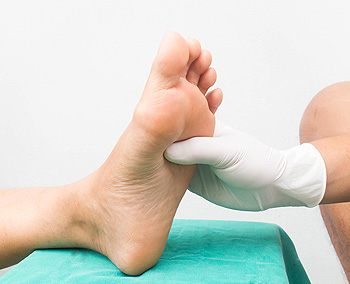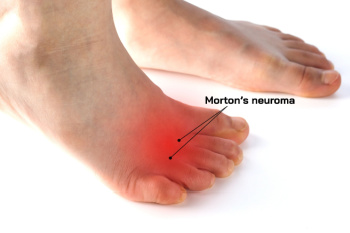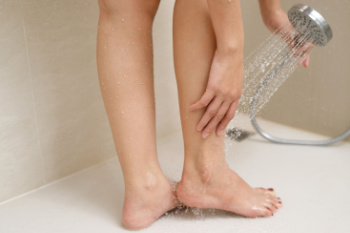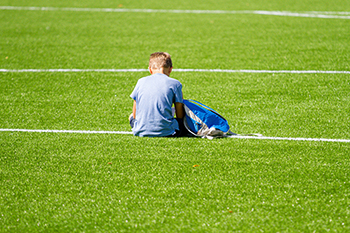Items filtered by date: August 2024
What Is Peripheral Neuropathy?

The brain and spinal cord make up the central nervous system, which, under normal circumstances, communicates with other parts of the body through the peripheral nervous system. When nerves within the peripheral nervous system become damaged and interrupt the complex messaging system with the central nervous system, this is known as peripheral neuropathy. Peripheral neuropathy can be caused by diabetes, injury, or autoimmune diseases. Sometimes vascular issues, infections, and certain medications can also cause peripheral neuropathy. This condition can cause stabbing or shooting pain, numbness, cramping, or burning in the feet. It can also result in extreme sensitivity to touch, lack of coordination, or clumsiness. If you are experiencing any of these symptoms, it is suggested that you schedule an appointment with a podiatrist who is adept at diagnosing and managing peripheral neuropathy in the lower extremities.
Neuropathy
Neuropathy can be a potentially serious condition, especially if it is left undiagnosed. If you have any concerns that you may be experiencing nerve loss in your feet, consult with Dr. Douglas Mckay from New Jersey . Our doctor will assess your condition and provide you with quality foot and ankle treatment for neuropathy.
What Is Neuropathy?
Neuropathy is a condition that leads to damage to the nerves in the body. Peripheral neuropathy, or neuropathy that affects your peripheral nervous system, usually occurs in the feet. Neuropathy can be triggered by a number of different causes. Such causes include diabetes, infections, cancers, disorders, and toxic substances.
Symptoms of Neuropathy Include:
- Numbness
- Sensation loss
- Prickling and tingling sensations
- Throbbing, freezing, burning pains
- Muscle weakness
Those with diabetes are at serious risk due to being unable to feel an ulcer on their feet. Diabetics usually also suffer from poor blood circulation. This can lead to the wound not healing, infections occurring, and the limb may have to be amputated.
Treatment
To treat neuropathy in the foot, podiatrists will first diagnose the cause of the neuropathy. Figuring out the underlying cause of the neuropathy will allow the podiatrist to prescribe the best treatment, whether it be caused by diabetes, toxic substance exposure, infection, etc. If the nerve has not died, then it’s possible that sensation may be able to return to the foot.
Pain medication may be issued for pain. Electrical nerve stimulation can be used to stimulate nerves. If the neuropathy is caused from pressure on the nerves, then surgery may be necessary.
If you have any questions, please feel free to contact one of our offices located in Caldwell, and Galloway, NJ . We offer the newest diagnostic and treatment technologies for all your foot care needs.
What Is Morton’s Neuroma?

Morton's neuroma is a painful condition affecting the ball of the foot, typically between the third and fourth toes. It involves the thickening of tissue surrounding one of the nerves leading to the toes, causing sharp, burning pain, numbness, or a sensation of something being lodged in the foot. To diagnose Morton's neuroma, a podiatrist will perform a physical examination, checking for tenderness and a palpable mass between the toes. Imaging tests like ultrasound or MRI scans may be used for confirmation. Treatment options include modifying footwear to reduce pressure on the affected area, using orthotic inserts, and administering corticosteroid injections to reduce inflammation. In severe cases, surgical removal of the affected nerve may be necessary to alleviate symptoms and restore normal foot function. If you have pain in the ball of your foot, it is suggested that you schedule an appointment with a podiatrist for a proper diagnosis and treatment plan.
Morton’s neuroma is a very uncomfortable condition to live with. If you think you have Morton’s neuroma, contact Dr. Douglas Mckay of New Jersey . Our doctor will attend to all of your foot care needs and answer any of your related questions.
Morton’s Neuroma
Morton's neuroma is a painful foot condition that commonly affects the areas between the second and third or third and fourth toe, although other areas of the foot are also susceptible. Morton’s neuroma is caused by an inflamed nerve in the foot that is being squeezed and aggravated by surrounding bones.
What Increases the Chances of Having Morton’s Neuroma?
- Ill-fitting high heels or shoes that add pressure to the toe or foot
- Jogging, running or any sport that involves constant impact to the foot
- Flat feet, bunions, and any other foot deformities
Morton’s neuroma is a very treatable condition. Orthotics and shoe inserts can often be used to alleviate the pain on the forefront of the feet. In more severe cases, corticosteroids can also be prescribed. In order to figure out the best treatment for your neuroma, it’s recommended to seek the care of a podiatrist who can diagnose your condition and provide different treatment options.
If you have any questions, please feel free to contact one of our offices located in Caldwell, and Galloway, NJ . We offer the newest diagnostic and treatment technologies for all your foot care needs.
Healthy Feet

Maintaining a daily foot care routine is vital for overall foot health and comfort. Begin by washing your feet with mild soap and warm water to remove dirt and prevent infections. Be sure to dry them thoroughly, especially between the toes, to avoid fungal issues. Regularly stretching your feet and ankles can enhance flexibility and reduce the risk of injuries. Incorporate simple stretches like toe raises and ankle circles into your daily routine. Trimming toenails properly is also essential. Cut them straight across to prevent ingrown toenails and avoid cutting too short, which can lead to discomfort. If you have developed any type of foot pain, it is suggested that you consult a podiatrist who can offer treatment remedies and guide you on how to care for your feet daily.
Everyday foot care is very important to prevent infection and other foot ailments. If you need your feet checked, contact Dr. Douglas Mckay from New Jersey . Our doctor can provide the care you need to keep you pain-free and on your feet.
Everyday Foot Care
Often, people take care of their bodies, face and hair more so than they do for their feet. But the feet are a very important aspect of our bodies, and one that we should pay more attention to. Without our feet, we would not be able to perform most daily tasks.
It is best to check your feet regularly to make sure there are no new bruises or cuts that you may not have noticed before. For dry feet, moisturizer can easily be a remedy and can be applied as often as necessary to the affected areas. Wearing shoes that fit well can also help you maintain good foot health, as well as making it easier to walk and do daily activities without the stress or pain of ill-fitting shoes, high heels, or even flip flops. Wearing clean socks with closed shoes is important to ensure that sweat and bacteria do not accumulate within the shoe. Clean socks help to prevent Athlete’s foot, fungi problems, bad odors, and can absorb sweat.
If you have any questions please feel free to contact one of our offices located in Caldwell, and Galloway, NJ . We offer the newest diagnostic and treatment technologies for all your foot and ankle needs.
Shin Splints and the Feet
 Shin splints, medically known as medial tibial stress syndrome, are a common condition resulting in pain along the inner edge of the shinbone, or tibia. This pain typically results from repetitive stress on the shinbone and the connective tissues that attach muscles to the bone from the ankle. Runners, dancers, and athletes who engage in high-impact activities are particularly at risk. The condition often occurs due to overuse, wearing improper footwear, or sudden increases in physical activity. Flat feet or abnormally high arches can worsen shin splints by causing improper alignment and distribution of stress during movement. Treatment for shin splints includes rest and anti-inflammatory medications to reduce pain and swelling. Stretching and strengthening exercises, along with wearing proper footwear, can prevent recurrence. A podiatrist can provide valuable assistance by evaluating your foot biomechanics and recommending custom orthotics to improve alignment and reduce stress on the tibia. If you have shin splints, it is suggested that you schedule an appointment with this type of doctor for care.
Shin splints, medically known as medial tibial stress syndrome, are a common condition resulting in pain along the inner edge of the shinbone, or tibia. This pain typically results from repetitive stress on the shinbone and the connective tissues that attach muscles to the bone from the ankle. Runners, dancers, and athletes who engage in high-impact activities are particularly at risk. The condition often occurs due to overuse, wearing improper footwear, or sudden increases in physical activity. Flat feet or abnormally high arches can worsen shin splints by causing improper alignment and distribution of stress during movement. Treatment for shin splints includes rest and anti-inflammatory medications to reduce pain and swelling. Stretching and strengthening exercises, along with wearing proper footwear, can prevent recurrence. A podiatrist can provide valuable assistance by evaluating your foot biomechanics and recommending custom orthotics to improve alignment and reduce stress on the tibia. If you have shin splints, it is suggested that you schedule an appointment with this type of doctor for care.
Ankle and foot injuries are common among athletes and in many sports. They can be caused by several problems and may be potentially serious. If you are feeling pain or think you were injured in a sporting event or when exercising, consult with Dr. Douglas Mckay from New Jersey . Our doctor will assess your condition and provide you with quality foot and ankle treatment.
Common Injuries
The most common injuries that occur in sporting activities include:
- Achilles Tendonitis
- Achilles Tendon Rupture
- Ankle Sprains
- Broken Foot
- Plantar Fasciitis
- Stress Fractures
- Turf Toe
Symptoms
Symptoms vary depending upon the injury and in some cases, there may be no symptoms at all. However, in most cases, some form of symptom is experienced. Pain, aching, burning, bruising, tenderness, tightness or stiffness, sensation loss, difficulty moving, and swelling are the most common symptoms.
Treatment
Just as symptoms vary depending upon the injury, so do treatment options. A common treatment method is known as the RICE method. This method involves rest, applying ice, compression and elevating the afflicted foot or ankle. If the injury appears to be more serious, surgery might be required, such as arthroscopic or reconstructive surgery. Lastly, rehabilitation or therapy might be needed to gain full functionality in the afflicted area. Any discomfort experienced by an athlete must be evaluated by a licensed, reputable medical professional.
If you have any questions, please feel free to contact one of our offices located in Caldwell, and Galloway, NJ . We offer the newest diagnostic and treatment technologies for all your foot care needs.


